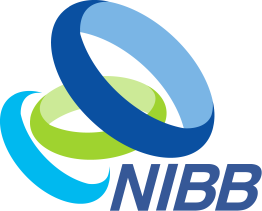
基礎生物学研究所

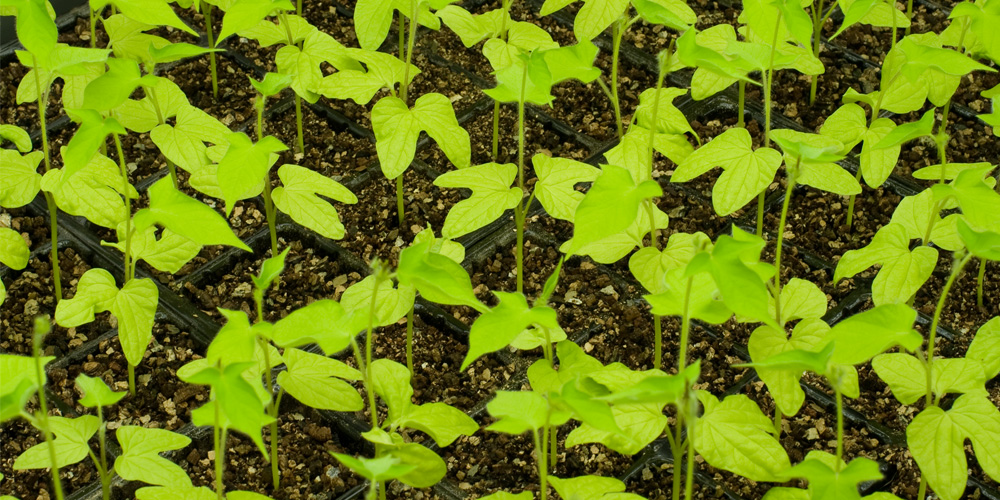
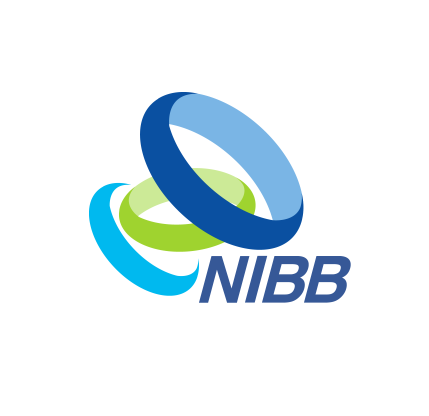

| Organizers | Andrew Cuming (Univ. Leeds) Yuji Hiwatashi (NIBB) Yasuko Kamisugi (Univ. Leeds) Minoru Kubo (ERATO, JST) Tetsuya Kurata (ERATO, JST) Takashi Murata (NIBB) Tomoaki Nishiyama (Kanazawa Univ.) Keiko Sakakibara (ERATO, JST) Yoshikatsu |
|---|---|
| Venue | National Institute for Basic Biology |
| Date | Jun. 29-Jul. 3, 2009 |
| Link | Website (http://www.nibb.ac.jp/course/past/4th/) |
| Poster |
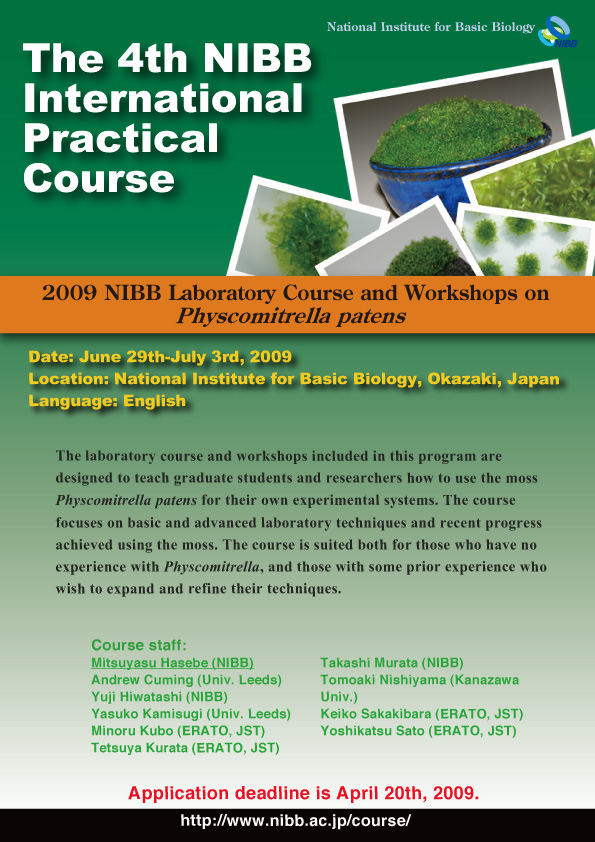
|
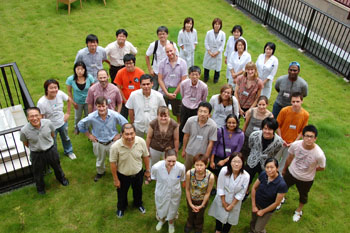
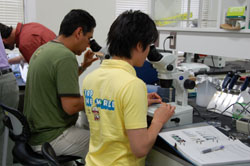
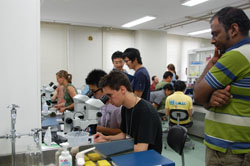
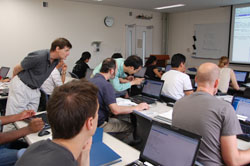
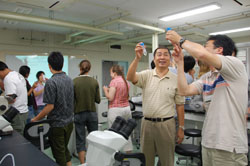
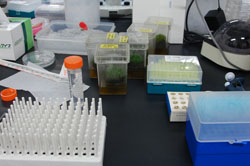
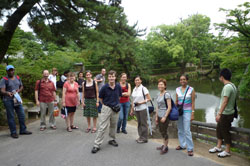
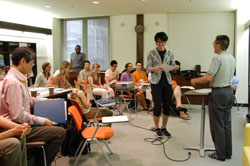
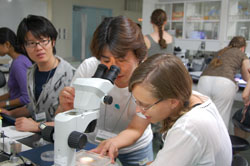
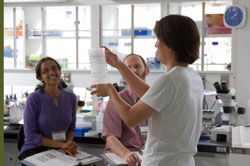
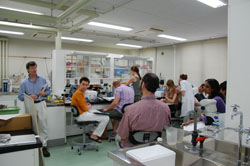
Program |
||
| June 28, Sun | ||
| 17:00 | Get together | |
| June 29, Mon | ||
| 09:00 |
Welcome address (Kiyotaka Okada, Director General of NIBB) |
|
| 09:05 | Introduction of course and Physcomitrella patens | Hasebe and Cuming |
| 09:35 | Spore germination | Hiwatashi |
| Culture and storage of protonemata and gametophores | Hiwatashi | |
| 10:15 | Observation of protonemata and gametophores | Sato |
| Analysis of protonema colony morphology | Sato | |
| Regeneration of protonemata from excised leaves-1 | Sato | |
| 11:05 | Induction of gametangia and sporophytes | Cuming and Kamisugi |
| Sporangium collection and storage | Cuming and Kamisugi | |
| Observation of antheridia and archegonia | Cuming and Kamisugi | |
| Observation of sperms | Cuming and Kamisugi | |
| 12:05 | Lunch | |
| 13:00 | PEG-mediated transformation | Hiwatashi, Cuming and Kamisugi |
| 17:00 | Crosses of mutants defective in the sporophyte formation | Cuming and Kamisugi |
| 18:00 | Dinner | Kurata |
| 20:00 | Workshop 1: Next generation sequencer | Kurata |
| June 30, Tue | ||
| 09:00 | PEG-mediated transformation | Hiwatashi, Cuming and Kamisugi |
| 13:00 | Lunch | |
| 14:00 | Genomic DNA extraction | Sakakibara |
| Chromatin immunoprecipitation | Kurata | |
| RNA extraction | Kurata | |
| Green PCR | Kubo | |
| 15:00 | DNA-gel-blot analysis | Sakakibara |
| RNA interference | Kurata | |
| Artificial micro RNA | Kurata | |
| Gene deletion | Sakakibara | |
| Conditional deletion | Kubo and Sato | |
| Dominant repression | Kubo | |
| Overexpression | Kubo | |
| Inducible expression | Kubo | |
| 18:00 | Dinner | |
| 20:00 | Workshop 2: Targeting strategy | Cuming and Kamisugi |
| July 1, Wed | ||
| 09:00 | PEG-mediated transformation | Hiwatashi, Cuming and Kamisugi |
| 11:00 | How to use genome information | Nishiyama |
| 12:00 | Lunch | |
| Free time / Seimar by Dr. Nir Ohad and Dr. Amal J. Johnston | ||
| July 2, Thu | ||
| 09:00 | How to use genome information | Nishiyama |
| 10:00 | Analysis of protonema development and growth | Sato and Hiwatashi |
| 11:00 | Observation of microtubules with indirect immunofluorescence microscopy | Murata |
| Light and electron microscopy of protonemata embedded with epoxy resin | Murata | |
| 12:00 | Lunch | |
| 13:00 | DAPI, Hoechst33342, and PI staining of protonemata | Murata |
| Visualization of cell wall with calcoflur | Murata | |
| 14:00 | Live imaging | Sato |
| Cellular localization of fluorescent protein | Sato | |
| Regeneration of protonemata from excised leaves-2 | Sato | |
| 16:00 | GUS staining | Hiwatashi |
| 17:00 | How to use genome information | Nishiyama |
| 18:00 | Dinner | |
| 20:00 | Workshop 3: Bioimaging | Sato, Murata, Cuming and Kamisugi |
| July 3, Fri | ||
| 09:00 | Measurement of DNA content with FACS | Sato |
| 10:00 |
Agrobacteria-mediated moss transformation: Protonema and Agrobacteria Co-culture |
Kurata |
| 12:00 | Lunch | |
| 13:00 |
Agrobacteria-mediated moss transformation: Protonema and Agrobacteria Co-culture |
Kurata |
| 14:00 | Hormone treatments | Cuming and Kamisugi |
| 15:00 | Light response | Sato |
| Gravitropic response | Sato | |
| 16:00 | Closing discussion | All lecturers |
| 17:00 | Farewell party | |